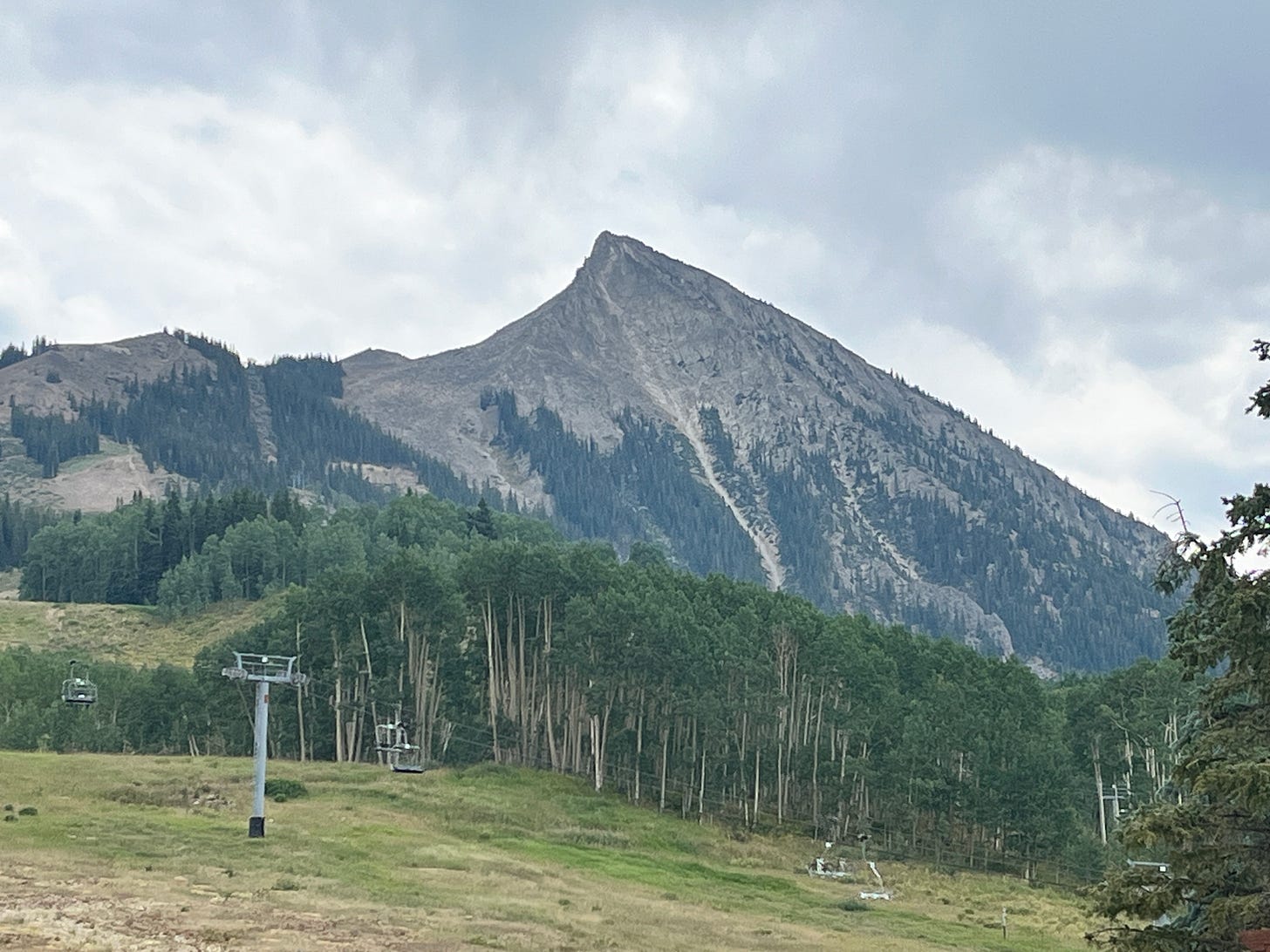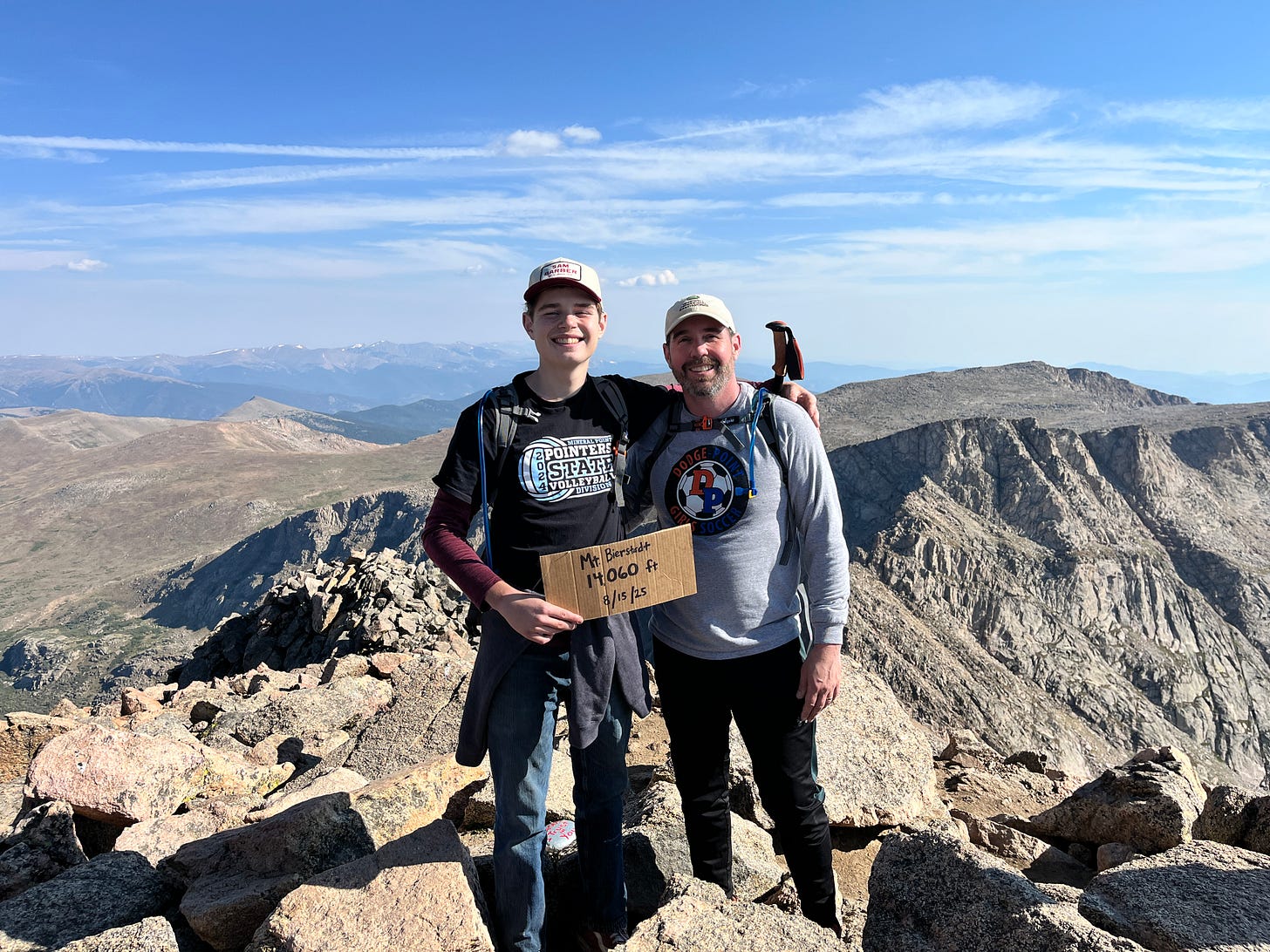The Best Way to Get Better at Anything
On surrounding yourself with people smarter than you
I just came home from a trip to Colorado with my son and friends. He is heading off to his first year of college soon, so we took advantage of what remained of summer with a week of mountain biking and hiking in the Rockies.
Going into the trip, I knew I would be the least skilled and most reluctant of the group. I have a bike, and I enjoy the mountain scene, but I have never been mountain biking. Combine that with the fact that I enjoy heights about as much as a root canal, and you might imagine how I was feeling heading into our adventure.
The gap in my knowledge and skill became most evident when my son called me…from the top of a mountain. “Hey Dad, can you see us at the top?”
Sitting at an outdoor table outside a restaurant, I stood, started to wave as I looked in his general direction, and realized the futility in my actions.
That’s not to say that I avoided these more extreme sports. I hiked every day, increasing my distance. While I didn’t hit the bike trails that circled some of these mountains, my son and I biked along a paved recreation path from one town to another.
Our trip culminated with reaching the top of a 14,000-foot summit.
I know I would not have reached the top of that summit or hiked as long as I did without the people around me. Not only did they have the knowledge about the area and what resources were needed (hydration packs and chapstick are necessary!). They also had the confidence I lacked to nudge me along. Their collective movement toward new limits gave me few options but to accept my current reality that I was a beginner and to be willing to sit with that uncomfortableness.
I share this as it seems like we have been operating like beginners since 2020. First, the pandemic which demanded that educators teach both virtually and in-person. Next, the blowback of students coming back to school full time without two years of traditional social interactions. Now, we are still managing the mandates of new reading laws that add more to educators’ plates without making the plates any wider, i.e. few additional resources along with the continued deprofessionalization of our practice. It doesn’t take much of an imagination to see why it has been one to many mountains to climb for our colleagues, 2/3 of whom are leaving and are not of retirement age.1 This has a profound impact on student learning; one estimate of teacher turnover during the school year is the loss of 32 to 72 instructional days.2 Clearly, this is not sustainable. It’s not reasonable to think that educators can remain in beginner’s mode without the adequate support and time needed to grow and feel empowered.
An avenue for support is surrounding oneself with people smarter than yourself. When I say “smarter”, I am not referring to the antiquated measure of I.Q. What I mean by smarter is people who have been there and done that with success, maybe in spite of their challenges. These professionals have found a way to not just survive but thrive in challenging conditions. They take the bumps along the trail as a challenge to respond to instead of one more barrier in their way of being successful.
A prime example occurred right in my school. Micki Uppena, our school library media and technology specialist, empowered students to become leaders and influencers. She invited 4th and 5th graders to audit the library catalog, collect feedback from peers, and purchased new books that the student body wanted to check out and read. (You can read more about this experience here.)
While Micki and the students knew what they wanted to accomplish, the pathway was not paved toward the destination. What books needed to go to make room for new titles? How would this project be sustainable over time? They moved through their uncomfortableness together, building commitment and strength as they realized the shared vision of a more inclusive and relevant school library.
Instead of ending with a list of tips and tricks to try in your school, consider the following reframing of common actions as more thoughtful questions.
1. Instead of knowledge building, whose knowledge do I need to tap into?
We are all beginners at some point. And even if we aren’t, there is nothing preventing us from entering a familiar situation with a beginner’s mind. Each day on this 14,000-foot mountain, the weather is difficult to predict. While it seems constant in the moment, the ecosystem is constantly changing. The weather in the Rockies is difficult to predict. While it was dry on the day of our climb, the rain could have come that afternoon. I listened to my group who wanted to start our trek at 6am and avoid any potential inclement weather.
2. Instead of feeling like the only one responsible for others’ success, how might we empower students and staff to support each other?
There may be one “summit” in education - each and every student succeeding - but the pathways to get there are numerous. A preferred approach is to share the responsibility for everyone succeeding. How can we teach others the value and skill of removing obstacles and offer supports as needed? On the way down the mountain, I gave my hiking pole to another person in our party. This is a tough sell in our world: giving away our advantages to make the whole group stronger. But what if we designed our schools around this simple truth?
3. Instead of thinking about what to do next, what is it that I can do right now?
What’s next can be delayed. It’s a list of what’s important when the urgency goes away (and it never does completely). Rather, what is sitting right in front of me that I can take action on? Going up that mountain, I eventually stopped looking at the top of the summit as I grew more tired. Instead, I focused on each step, navigating around jutting rock and staying with my fellow travelers.
Who in your world do you need to connect with more frequently? What might shared leadership look like in your context? What can you do right now?
Take care,
Matt
P.S. - If you're interested in exploring how this beginner's mindset applies to classroom observations and instructional leadership, I'm offering a four-week course starting on September 29 on helping leaders get into classrooms more effectively. See here for details.
https://www.umassglobal.edu/blog-news/teacher-turnover
https://www.researchgate.net/publication/327803610_The_Consequences_of_Leaving_School_Early_The_Effects_of_Within-Year_and_End-of-Year_Teacher_Turnover




This is a terrific article Matt and an important one for all of us, regardless of our area of expertise. Loved reading it--your hiking experience and your personal growth experience. Impressive! "Surrounding yourself with people smarter than you" is what great leaders and thinkers do. It takes confidence and allowing ourselves to be vulnerable and open that makes activating that mindset possible.